As critical praise and box office success for the new Dune movie draw new audiences into the science fiction epic, its mythic world and timely themes beg some fresh questions: How did the author behind the novels, first published 59 years ago, conceive of this story that foreshadowed so many of today’s biggest issues?
From the perils of climate change and artificial intelligence to the escalating wars in oil-rich lands to an antagonist named Vladimir, the legendary sci-fi author Frank Herbert seemed to share some of the powers of prediction that he granted his protagonist, Paul Atreides.
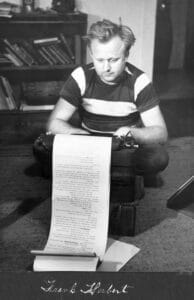
Herbert was a journalist at the Oregon Statesman in the 1950s when he first hatched the idea that would become Dune, investigating a U.S. Department of Agriculture project aimed at controlling the sand dunes that were blowing across highways in his home state. The first novel in the series was rejected by 23 mainstream publishers before an automotive manuals publisher eventually got on board, launching what would become the best-selling science fiction novel of all time.
In interviews he granted in the late 1960s and 70s, Herbert elaborated on the religious, political, and mystical influences that shaped his first book, revealing a mind full of “vectors” that sometimes seemed at odds, much like within his characters.
But six big themes emerged that made us far more intrigued about the world of Dune.
First, a quick refresher synopsis of the original story: Set in a distant future, in which humanity has spread across the universe to build an interplanetary empire, the noble Atreides family has been sent to control the desert planet of Arrakis, home to an extremely valuable drug called spice. A rival family, the Harkonnens, battle the Atreides for control over the planet, which forces the young nobleman Paul and his mother Lady Jessica to hide among the Fremen, the indigenous people of Arrakis. As they learn their ways, they rise up to power among them, as Paul wrestles with his prophesied role as the leader destined to save them.
JFK, Catholicism, and messiahs
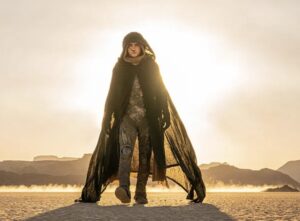
A student of comparative religions who was raised Catholic, Herbert became fascinated by the idea of prophets and messiahs. In 1969, he sat for a lengthy recorded interview with Cal State English professor Willis McNelly, and shared that he developed his protagonist as a way to “trace how a messiah can be created – by a society and within a person.”
When he was writing the novel in 1964, the lionizing of JFK was approaching messianic proportions. Over 100 educational institutions, 46 bridges and highways, two airports and a space center were being named after him, as his picture was hung in homes around the world, often sharing a wall with a cross. Five years later, a more human portrait of the slain president was emerging. “Look at what’s happening to John F. Kennedy,” he says to McNelly. “He was a very earthy, real and not totally holy man. Here we have a likable person, real in the flesh and blood sense, who by the process of immolation becomes something far larger than life.”
He points to an oft-quoted line in his novel: “The man must recognize the myth he’s living in.”
Much like JFK, Herbert was raised in a large Irish Catholic family that was heavily influenced by the Jesuits. As his son Brian Herbert writes in this 2003 book, Dreamer of Dune: A Biography of Frank Herbert, Paul’s mother, Lady Jessica, and the women of Bene Gesserit — the influential political and religious order in the books and films — were based on the novelist’s mother and many strict Catholic aunts, Gesserit being a twist on the word Jesuit.
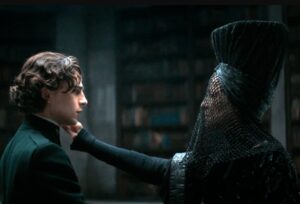
“His Irish Catholic maternal aunts, who attempted to force religion on him, became the models for the Bene Gesserit Sisterhood of Dune,” his son writes.
Like the Jesuits, the Bene Gesserit share a commitment to public service, education and missionary work while wielding influence behind the scenes. Yet unlike the Jesuits, this sisterhood of nuns does not answer to any male authorities.
Of course, they still lacked any formal power in this patriarchal world, where the Emperor and all other rulers were male and power passed from father to son. The elder stateswomen serve as “brokers” of their younger sisters to powerful men, trading them as “bound concubines” who often become impregnated — as was the case with Paul’s mother, Lady Jessica, and his father, Duke Leto Atreides.
Like a lot of groups formed on the outside of the official power structures, the Bene Gesserit are secretive, their ranks full of spies and scientists who use genetic engineering to further their agenda. And a big part of that agenda is Paul, the outcome of their centuries-long breeding program intended to create the “Kwisatz Haderach,” a kind of superhuman with advanced cognitive abilities who could rule the universe, albeit with the sisterhood pulling strings behind the scenes.
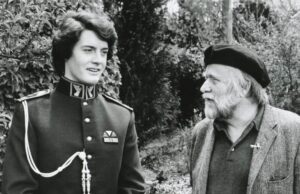
Throughout the novels that follow the original Dune, the portrait of the Bene Gesserit evolves, as they become less like controlling, manipulative aunts “forcing religion” on everyone and more like a kind of NATO force that’s increasingly important to maintaining peace and stability, a necessary counterbalance to the relentless cycle of violence enacted by the male-led armies.
As for what the author’s own fears were rooted in, as he explains in his interviews, they became more urgent than anything his childhood full of Catholic aunts could have inspired.
Morals, absolutes and “the natural condition”
While Catholicism was Herbert’s first introduction to religion, he went on to study several others, which led him to the realization that “many religions began in desert environments.” Setting Dune in the arid planet of Arrakis was a way for him to contrast religious themes with ecological concerns.
At the root of many of the tensions of life on this planet is a conflict between the moral codes and ethical laws and the brutal fight for a survival under the extreme conditions and escalating threats. This is “the fallacy of absolutism,” Herbert says to McNelly. “The moral norm as I saw it in Dune is something imposed on people by their environment. It’s as fixed as how many wives a man in this culture can support and thereby have, and what possessions can he carry from one stopping place to another.”
The organizing principle that drives everything, he continues, is feudalism or “tribal organizations,” what he sees as the natural default for humans, pointing to everything from the Roman Catholic church to “the hippies” to universities to illustrate his point. “Not that it’s the only or the right condition – just the way we have of falling into organizations.”
Across the planets of the Dune galaxy, people organize into “orders” with hard lines and levels of power to enforce control. Within these strict tribal ranks are the roots of the deep-seeded feuds that pass from one generation to the next, as in the war between the Atreides and the Harkonnens.
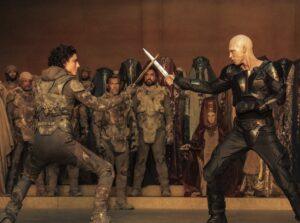
Scholars and fans have long speculated that the Harkonnens represent Russia — their leader’s first name is Vladimir, despite being written when the current Russian leader was a boy — while the Atreides represent everything from the EU to the West to Great Britain to the United States. “Much of it followed the script of the good colonizer versus the bad colonizer, an idea central to Herbert’s politics and to Dune,” writes Ruby Baron in NYU’s Confluence. “Russia was painted as the villainous power––the tyrants and oppressors. The United States was the charitable power––traveling around the world protecting helpless people from tyranny and offering them freedom.” That’s where Paul’s destiny comes in, to lead the Freman to freedom.
Fortune telling, Tarot cards and computers
The notion of foresight in the novel was not just about religious prophecies and messiahs. It was something personal to the author. He had experienced his own powers of prediction earlier in his life. “I contend there is such a thing,” he says to McNelly about foresight, before elaborating on a time when he predicted all the cards about to be laid out from a deck that was repeatedly shuffled by a date.
“Now, whether I saw a reflection in her eyes or whether some actual keyed-in transmission or simpatico or empathy was rampant in this atmosphere, I predicted what the cards were.” The date stopped him, he says, as he was scaring her, and he never had the powers of prognostication again.
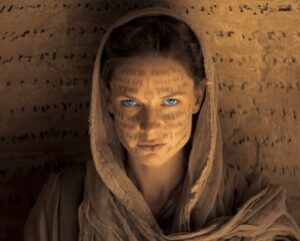
Herbert’s bout of special vision inspired an interest in Tarot cards and their power to interfere in peoples’ lives. In fact, the influences of the cards motifs can be found throughout the novels and in the latest films’ through the robes of the Bene Gesserit. Paul also refers to Tarot, but he sees it as “the fog” that gets in the way of his powers, throwing him off his logical course.
Contrasting religious prophecy, “transmission” and Tarot to the data-collecting computers that were gaining attention in the 60s, Herbert conceived of the idea of a “Mentat,” a human trained to process information like a computer with the goal of achieving “supreme accomplishments of logic.”
In the first Dune novel, the young Paul is chosen to become a Mentat, which is how he develops advanced cognitive skills. “A mechanical scientific principle is if you get enough data to bear on something, you will understand it,” Herbert says to McKenny. “This doesn’t follow that we can understand everything. See what happened in Greek historic times, when the Oracle had terrifying accuracy. You went to Delphi, or the local madman, who might kill a chicken to see which way the blood spurts.”
Herbert’s characters, whether through religion, superstitious stories, or special cognitive training, are all trying to see into and control the future. What they can’t see is how their pursuit of foresight is interfering with their destinies. “If you immerse a society in a great deal of storytelling, you cloud the whole process” — interfering with both logic and with destiny.
Of course, Herbert went on to publish five more novels set in the wildly weird and rich storytelling universe that is Dune, which has since spawned a 1984 film, a 2000 TV series, Denis Villaneuve’s Dune Part One (2021), and the latest Part Two — not to mention influencing the mythologies of everything from Star Wars to Game of the Thrones.
“The name of the game is power, you see, as it is today”
Throughout the 1950s, in between jobs as a journalist for Oregon newspapers, Herbert went to work for the Republican senator Guy Cordon and traveled with him overseas, where he witnessed the atomic tests in Bikini Atoll, according to an essay by history professor Daniel Immerwahr. The role also introduced him to American mining operations for oil, natural gas, and minerals under the oceans near Hawaii and American Samoa.
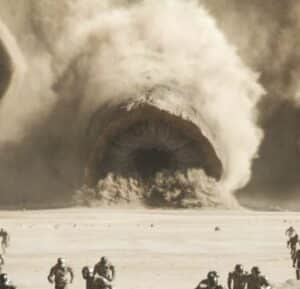
In February of 1969, at the time of his recorded talk, Nixon had just taken office as the war in Vietnam was escalating. Nuclear weapons were on everyone’s mind. Herbert’s novel had been widely read by scientists, many of them enlisted by government agencies and the military to expand on weapons programs.
“The basic fallacy of science, and what science fiction is based upon, is that humans can invent anything we can imagine,” he says to McNelly. “And having invented it, we must use it.”
“Western man has assumed that all you need for any problem is enough force or power. And that there is no problem that won’t submit to this approach, even the problem of our own ignorance…which throws the whole thing out the window.”
What is the answer that Herbert seeks? “A science of wisdom,” he responds.
The unanswered questions
The first novel left many of Herbert’s readers dissatisfied with its loose threads, and when asked about the many questions left open, the author explains that it was intentional. “It’s the reason why stories are remembered – the ones that strike sparks from your mind.”
He recalls playing Treasure Island and Tom Sawyer as a boy and reenacting the characters arcs in play. “I want the person to go on and construct for himself all of these marvelous flights of fantasy and imagination.”
As long as they do not involve being saved by some messianic figure. “The bottom line of the Dune trilogy is, beware of heroes,” he concludes. “It’s much better to rely on your own judgment, and your own mistakes.”
As for his own “science of wisdom” this is where the novelist’s own foresight was on full display. In his PBS interview, in 1977, he references the themes of Dune to sound the alarm on fossil fuels and press for the urgent need for a shift to renewable energy. “We really have to start taking those steps now. We have the latitude and resources to make these changes today.”
The interview wraps with this final quote, which he would later repeat: “I don’t want to be in the position, I refuse to be put in the position, to tell my grandchildren: ‘I’m sorry there’s no more world for you. We used it all up.’”
Dune: Part Two is playing in theaters. Read the Watercooler’s review by Felipe Patterson.


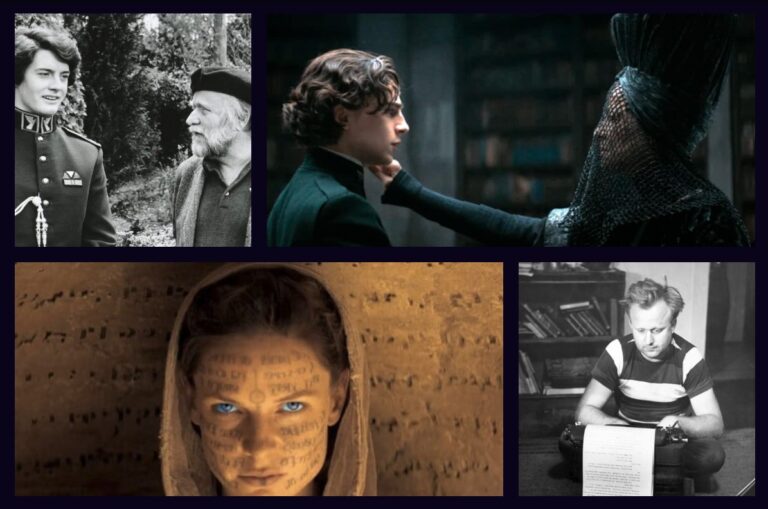
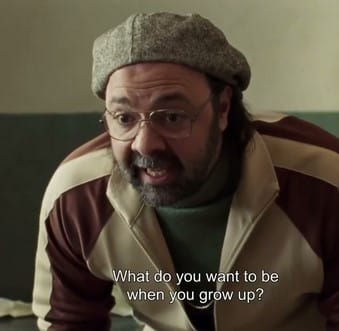
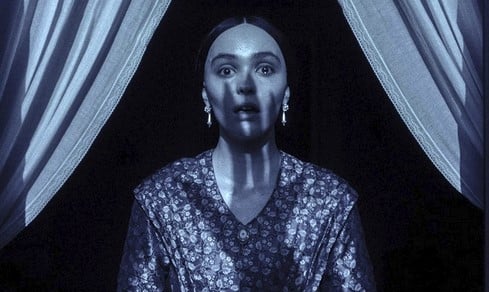

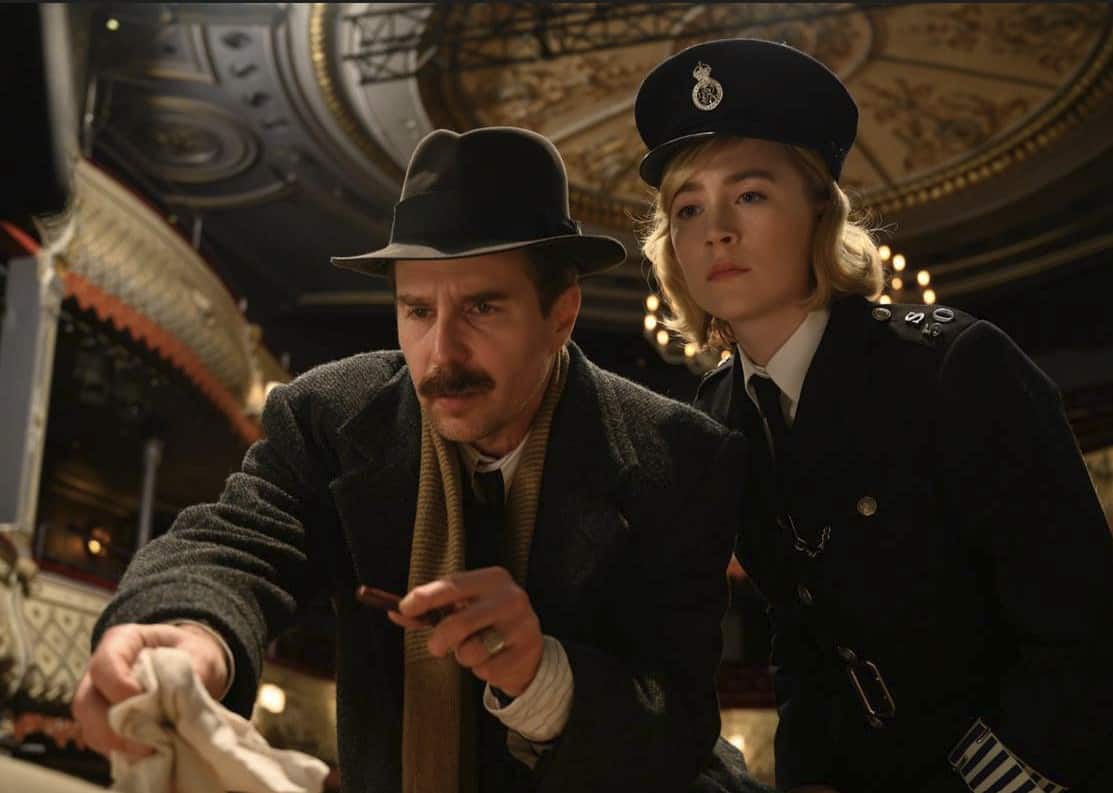
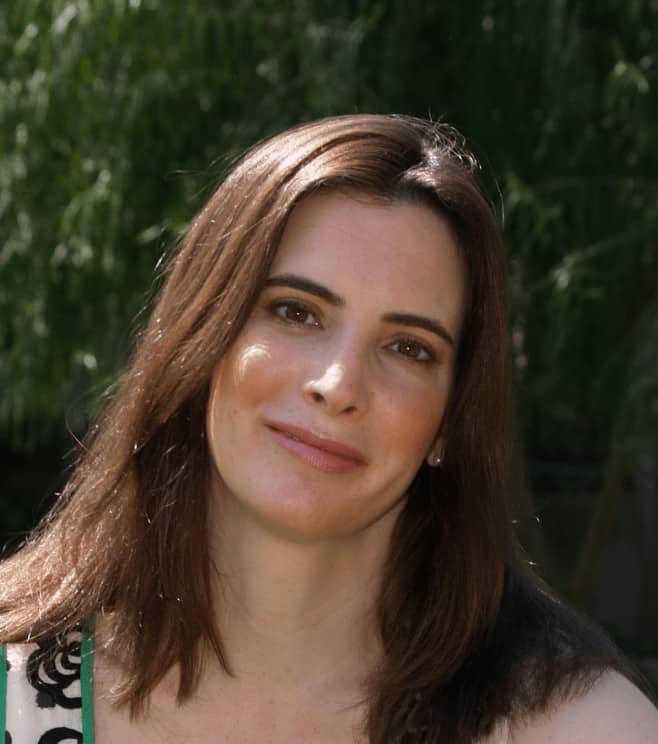
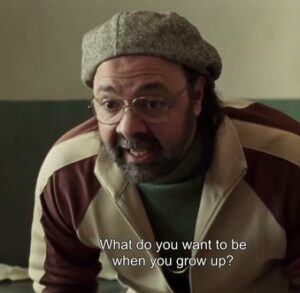
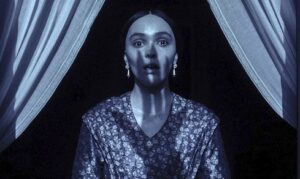
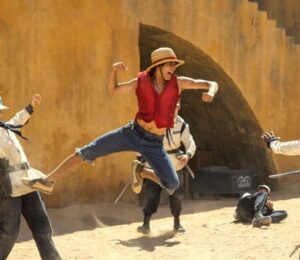
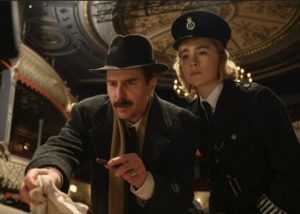
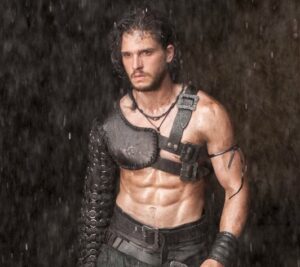

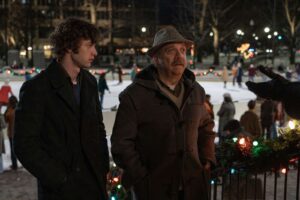

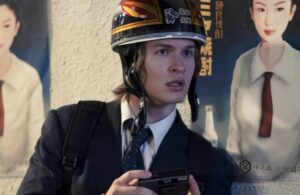
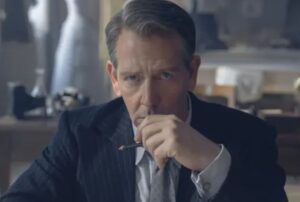



Start a watercooler conversation: